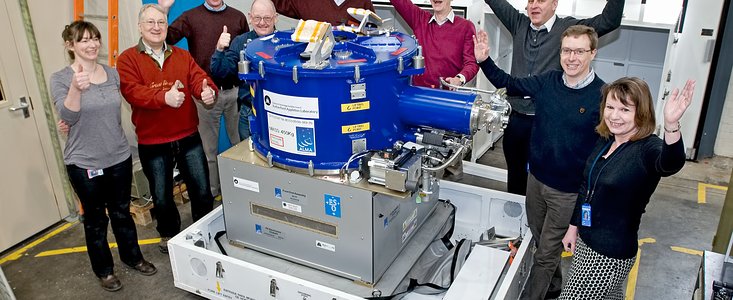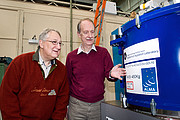Mitteilung
ALMA-Empfangsmodule ausgeliefert
Die Ankunft des letzten europäischen Teils schließt eine weitere Phase beim Bau von ALMA ab
22. Februar 2013
Die letzte Empfangsmodul für das Atacama Large Millimeter/submillimeter Array (ALMA) wurde an die Operations Support Facility (OSF) des Observatoriums ausgeliefert – ein weiterer Meilenstein auf dem Weg zur Fertigstellung des Projekts. Mit je einem installierten Modul in jeder der 66 ALMA-Antennen sind die Empfangsmodule der erste Schritt in einer langen Kette von Geräten zum Empfangen, Konvertieren, Verarbeiten und Speichern der von dem Teleskop gesammelten astronomischen Daten. Jedes Empfangsmodul enthält einen Satz extrem empfindlicher Empfänger, die auf Temperaturen von 4 Grad über dem absoluten Nullpunkt (-269°C) gekühlt werden und das Licht bei Millimeter- und Submillimeterwellenlängen detektieren, das ALMA „sieht“.
Der Bau der Module wurde zwischen den Projektpartnern in Europa, Nordamerika und Ostasien aufgeteilt. Sechsundzwanzig der insgesamt 70 Einheiten wurden am European Front End Integration Centre mit Sitz am Rutherford Appleton Laboratory (RAL) in Großbritannien inklusive des abschließenden Designs gebaut. Diese 26 Einheiten sind einer der Beiträge der ESO als der europäische Partner im ALMA-Projekt.
„Die hochmodernen Empfangsmodule sind ein kritischer Punkt für den erfolgreichen Betrieb von ALMA. RAL als Gastgeber des European Front End Integration Centres (EuFEIC) für die ESO ist hocherfreut, das Modul mit der Nummer 70, das letzte im Projekt, an Chile ausgeliefert zu haben. Trotz des späteren Starts der Entwicklung im Vergleich zu den ostasiatischen und nordamerikanischen Partnern hat EuFEIC seine Prouktionsrate während des Jahres 2012 gesteigert, um die Auslieferung und damit diese wichtige Phase des ALMA-Baus innerhalb der Zeitvorgabe zu gewährleisten“, sagte Brian Ellison, der ALMA-Projektkoordinator in Großbritannien.
Mit Ankunft der Module auf der ALMA-Anlage werden die Empfangseinheiten weiteren Eingangstests an der OSF unterzogen. Die formale Abnahme wird den Abschluss der Arbeiten für das European Front End Integration Centre und für die europäische Empfangsmodulentwicklung als Ganzes bedeuten. Das ALMA-Observatorium wird formell am 13. März eingeweiht (siehe die Einladung an die Medien unter ann12092).
Weitere Informationen
ALMA ist eine internationale Einrichtung, die gemeinsam von Europa, Nordamerika und Ostasien in Zusammenarbeit mit der Republik Chile getragen wird. Bei Entwicklung, Aufbau und Betrieb des Observatoriums ist die ESO zuständig für den europäischen Beitrag, das National Astronomical Observatory of Japan für Ostasien und das National Radio Astronomy Observatory für den nordamerikanischen Beitrag. Das Joint ALMA Observatory übernimmt die übergreifende Projektleitung für den Aufbau, die Inbetriebnahme und den Beobachtungsbetrieb von ALMA.
Links
Kontaktinformationen
Gie Han Tan
ESO ALMA European Front End Project Manager
Garching bei München
Tel: 089 3200 6487
E-Mail: ghtan@eso.org
Peter Hekman
ESO Liaison Officer at ALMA European FEIC, Rutherford Appleton Laboratory
Didcot, United Kingdom
Tel: +44 1235 44 6741
E-Mail: phekman@eso.org
Douglas Pierce-Price
Public Information Officer, European Southern Observatory
Garching bei München
Tel: 089 3200 6759
E-Mail: dpiercep@eso.org
Über die Mitteilung
| ID: | ann13011 |
Our use of Cookies
We use cookies that are essential for accessing our websites and using our services. We also use cookies to analyse, measure and improve our websites’ performance, to enable content sharing via social media and to display media content hosted on third-party platforms.
ESO Cookies Policy
The European Organisation for Astronomical Research in the Southern Hemisphere (ESO) is the pre-eminent intergovernmental science and technology organisation in astronomy. It carries out an ambitious programme focused on the design, construction and operation of powerful ground-based observing facilities for astronomy.
This Cookies Policy is intended to provide clarity by outlining the cookies used on the ESO public websites, their functions, the options you have for controlling them, and the ways you can contact us for additional details.
What are cookies?
Cookies are small pieces of data stored on your device by websites you visit. They serve various purposes, such as remembering login credentials and preferences and enhance your browsing experience.
Categories of cookies we use
Essential cookies (always active): These cookies are strictly necessary for the proper functioning of our website. Without these cookies, the website cannot operate correctly, and certain services, such as logging in or accessing secure areas, may not be available; because they are essential for the website’s operation, they cannot be disabled.
Functional Cookies: These cookies enhance your browsing experience by enabling additional features and personalization, such as remembering your preferences and settings. While not strictly necessary for the website to function, they improve usability and convenience; these cookies are only placed if you provide your consent.
Analytics cookies: These cookies collect information about how visitors interact with our website, such as which pages are visited most often and how users navigate the site. This data helps us improve website performance, optimize content, and enhance the user experience; these cookies are only placed if you provide your consent. We use the following analytics cookies.
Matomo Cookies:
This website uses Matomo (formerly Piwik), an open source software which enables the statistical analysis of website visits. Matomo uses cookies (text files) which are saved on your computer and which allow us to analyze how you use our website. The website user information generated by the cookies will only be saved on the servers of our IT Department. We use this information to analyze www.eso.org visits and to prepare reports on website activities. These data will not be disclosed to third parties.
On behalf of ESO, Matomo will use this information for the purpose of evaluating your use of the website, compiling reports on website activity and providing other services relating to website activity and internet usage.
Matomo cookies settings:
Additional Third-party cookies on ESO websites: some of our pages display content from external providers, e.g. YouTube.
Such third-party services are outside of ESO control and may, at any time, change their terms of service, use of cookies, etc.
YouTube: Some videos on the ESO website are embedded from ESO’s official YouTube channel. We have enabled YouTube’s privacy-enhanced mode, meaning that no cookies are set unless the user actively clicks on the video to play it. Additionally, in this mode, YouTube does not store any personally identifiable cookie data for embedded video playbacks. For more details, please refer to YouTube’s embedding videos information page.
Cookies can also be classified based on the following elements.
Regarding the domain, there are:
- First-party cookies, set by the website you are currently visiting. They are stored by the same domain that you are browsing and are used to enhance your experience on that site;
- Third-party cookies, set by a domain other than the one you are currently visiting.
As for their duration, cookies can be:
- Browser-session cookies, which are deleted when the user closes the browser;
- Stored cookies, which stay on the user's device for a predetermined period of time.
How to manage cookies
Cookie settings: You can modify your cookie choices for the ESO webpages at any time by clicking on the link Cookie settings at the bottom of any page.
In your browser: If you wish to delete cookies or instruct your browser to delete or block cookies by default, please visit the help pages of your browser:
Please be aware that if you delete or decline cookies, certain functionalities of our website may be not be available and your browsing experience may be affected.
You can set most browsers to prevent any cookies being placed on your device, but you may then have to manually adjust some preferences every time you visit a site/page. And some services and functionalities may not work properly at all (e.g. profile logging-in, shop check out).
Updates to the ESO Cookies Policy
The ESO Cookies Policy may be subject to future updates, which will be made available on this page.
Additional information
For any queries related to cookies, please contact: pdprATesoDOTorg.
As ESO public webpages are managed by our Department of Communication, your questions will be dealt with the support of the said Department.


